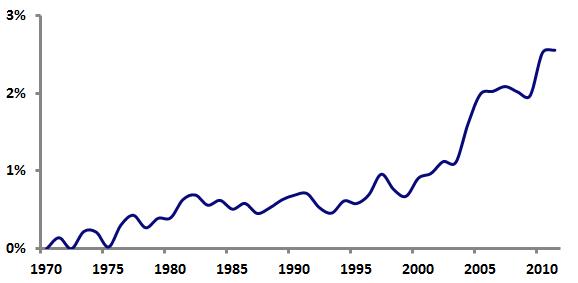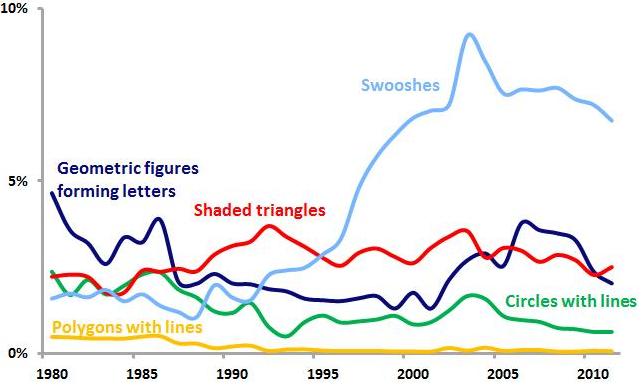As China rings in the Year of the Snake, it’s a good time to look at the increasing prominence of the nation’s logos. The recent growth of the Chinese economy has brought with it a big jump in the number of trademarks that Chinese firms are filing in the United States. By 2011, Chinese companies accounted for 2.56 percent of the logos filed for trademark registration in the US.
Chinese logos filed for US trademark registration, as a percentage of all US logo filings
Are there any logo design trends associated with this influx of Chinese marks? Analysis of United States Patent and Trademark Office data shows that, over the period from 2007 through 2011, certain design elements are much more likely to appear in logos from China than in non-Chinese logos.
Totally unsurprisingly, Chinese logos are 30.6 times more likely than other logos to contain inscriptions written with Asian characters.
Similarly, Chinese logos are 7.35 times more likely to feature depictions of Asian men and 4.39 times more likely to include Asian women.
Polygonal shapes containing bars or lines seem to be a popular element in Chinese design; they are 3.99 times more likely to appear in logos from China. Notably, abstract marks in general are 1.64 times more common in Chinese logos.
Pandas are 3.67 times more likely to appear in Chinese logos.
Circles with bars or lines are featured in Chinese logos 2.50 times more often than in non-Chinese logos.
Geometric figures forming letters are 1.99 times more likely to appear in Chinese logos.
Shaded triangles are 1.77 times more common in Chinese logos.
“Swooshes” appear in Chinese logos 1.52 times more than in other logos.
Design elements as a percentage of all logos filed by US companies
The graph above shows the five abstract logo design trends popular within Chinese logos in terms of logos from American companies only. Swooshes, shaded triangles, and geometric figures forming letters have all enjoyed relatively recent popularity in US logos, suggesting that their prominence in Chinese logos may be due to logo trends spreading worldwide. But the relative paucity of US logos featuring circles with lines and polygons with lines indicates that these logo design trends may be more specific to China. Even in an increasingly globalized economy, it appears that there is still room for regional and national variation in logo design styles.










